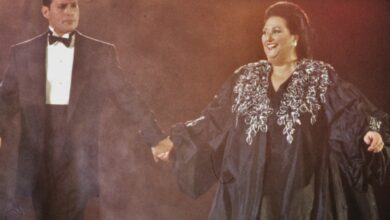A Majestic Tribute: Royal Marines Transform a Rock Classic at Royal Albert Hall
The moment the Bands of HM Royal Marines launched into “Stairway to Heaven” during the Mountbatten Festival of Music, the atmosphere inside the Royal Albert Hall shifted from formal ceremony to something spellbinding. The delicate introductory notes, translated through woodwinds and soft strings, floated across the hall with unexpected warmth. It felt like the mystical air of Led Zeppelin’s original had been transported into a setting defined by historic prestige and distinguished uniformed performers. Listeners immediately understood they were witnessing a bold and respectful transformation of a rock classic into a full symphonic experience that retained its soulful essence while offering a new emotional pathway.
The Royal Marines Band Service has earned its reputation as one of the world’s most technically accomplished and disciplined musical forces. Their roots stretch back through decades of demanding training, where each musician must not only master performance but also uphold ceremonial traditions central to naval identity. When they take the stage, their precision reflects countless hours spent perfecting every note and formation. This is not merely entertainment for them. These performers hold military duties and artistic mastery in equal regard, making any ambitious arrangement an opportunity to showcase that dual strength and their ability to elevate complex works without losing emotional authenticity.
The band’s musical catalog spans everything from historical marches to daring reinterpretations of pop culture staples. Tackling a sacred cornerstone of rock history like “Stairway to Heaven” was a fearless leap into artistic reinvention rather than a simple cover choice. It represented an intentional decision to unite ceremonial tradition with modern expression, reinforcing that even the most iconic songs can continue evolving. Instead of softening the tune for comfort, they honored its spirit by heightening contrasts: combining bold brass surges with ethereal melodic passages so the audience could rediscover the familiar in a new cinematic format.
As the arrangement unfolded, the performance honored the legendary structure listeners expect. The gentle folk textures at the start carried an emotional purity that set the stage for the dynamic build to come. The musicians guided the audience through a meticulous ascent, letting the piece bloom with each new layer. Percussion thundered at the perfect moments, while harmonies rose with breathtaking unity. The orchestral adaptation did not rewrite Zeppelin’s storytelling. Instead, it highlighted new facets of tension and release, creating an exhilarating dialogue between rock lineage and symphonic grandeur that deeply resonated with both longtime fans and first-time listeners.
Lead guitarist Lance Corporal Matt Gregory stood front and center in full ceremonial uniform, delivering riffs with a calm confidence that carried the electrifying essence of Jimmy Page’s signature tone. Opposite him, vocalist Sam McIndoe channeled the mystery and emotional force of Robert Plant’s voice with remarkable originality, choosing expression over imitation. Their controlled power created a compelling partnership, one moment rooted in rock authenticity and the next enveloped in orchestral sophistication. The contrast between military posture and artistic vulnerability added a refreshing layer that helped the performance captivate without ever overshadowing the song’s origins.
The grandeur of the Royal Albert Hall intensified every musical moment. Its circular balconies and iconic acoustic design created a cinematic backdrop that elevated both sight and sound. Knowing that Led Zeppelin themselves performed on that famous stage in the early 1970s added another layer of meaning. The Marines weren’t simply borrowing someone else’s legacy; they were stepping into the same historic arena and adding their own chapter to the venue’s ongoing narrative. The weight of the hall’s legacy lingered around the musicians, strengthening their bold fusion of tradition and timeless rock artistry.
Audience reactions throughout the hall and online reflected pure astonishment. Many spectators had arrived expecting a traditional musical showcase supported by a respected military ensemble, yet what they encountered was fearless creativity that transcended expectations. The applause erupted like a release of shared surprise and admiration. Online, viewers described the performance as spine-tingling and emotionally overwhelming. People from many musical backgrounds praised how the Marines managed to honor the original while imbuing it with a new identity, reminding the world that music is never static, even when rooted in beloved classics.
What began as a moment experienced by those inside the venue soon expanded into a global wave of attention. The video soared past a million views, spreading quickly across social media platforms and playlists. Discussion threads emerged in rock communities, classical forums, and even military circles, all acknowledging the same thing: this band refused to be confined by genre labels. Their success demonstrated that artistic courage can bring unexpected audiences together. With every share, this rendition traveled farther beyond London’s boundaries, proving that music presented with passion can hold universal appeal.
Despite streaming services categorizing the piece under modest labels like “easy listening,” the emotional magnitude delivered by the Royal Marines’ arrangement revealed something far richer. This was no tribute performed for novelty or nostalgia. It was a declaration that even musicians bound by centuries of tradition can innovate with confidence. They embraced Zeppelin’s classic as material worthy of reinterpretation rather than preservation in amber. The musicians asserted themselves not only as keepers of ceremonial heritage but as inventive contributors to modern artistic expression.
The band has always carried historical significance, evolving from battlefield signals to ambassadors of cultural identity. Incorporating a legendary rock anthem into their performance history revealed a natural progression of that role. The Marines demonstrated that storytelling through music remains central to their mission, whether delivering patriotic themes or channeling the emotions of a genre associated with rebellion. By adding “Stairway to Heaven” to their body of work, they didn’t stray from tradition. They expanded it, inviting audiences to see familiar symbols in a different light.
This wasn’t their first connection to rock royalty. Their collaboration with Iron Maiden’s Nicko McBrain showcased their willingness to explore heavy, emotionally charged material. Still, “Stairway to Heaven” set a particularly high bar because of the song’s immense cultural weight and deep fan devotion. Their stunning achievement demonstrated not only technical excellence but profound emotional intelligence. They handled every transition—from soft reflection to thunderous climax—with respect for what each moment in the composition meant to listeners who have lived with the song for decades.
Military bands are often viewed as symbols of structure and national pride rather than as drivers of artistic evolution. Yet this performance overturned that expectation by drawing in audiences who might never have noticed a formal ensemble otherwise. Their viral reach transformed them into cultural connectors. They showed that uniforms and medals don’t limit creativity. Instead, discipline can elevate expression, enabling something unexpected to unfold when old and new collide. Their video continues to shift public perception, proving that innovation isn’t only for those who break rules, but also for those who understand them deeply.
The journey of this song—from the quiet inspiration found in a remote country setting to the powerful brass resonance filling London’s most iconic concert hall—illustrates how music continues reshaping itself as time moves forward. The Marines’ performance became another chapter in its evolution. They did not try to replace the classic, but to add another voice to its long history. The fusion served as a testament to how a piece originally rooted in the imaginative world of rock lore can thrive in the structured realm of orchestral performance.
As years pass and the Mountbatten Festival continues, the Royal Marines Band will likely revisit bold genre blends, reinforcing this spirit of exploration. Each step into new musical territory reinforces that innovation and tradition are not adversaries. When they embrace one another, audiences discover fresh meaning in songs they thought they already understood. Their performances remind us that boundaries are not walls, but invitations to climb higher.
When the final notes faded and the applause morphed into memories, what lingered most was a renewed appreciation for creative bravery. The Marines didn’t rely on volume or spectacle alone. They let emotion, structure, and confident reinterpretation guide them. Their take on “Stairway to Heaven” celebrated both where the song began and where it could still go. It showed that great art thrives through reinvention, and that sometimes, the most powerful collaborations happen where no one expected genres to meet but everyone is grateful when they finally do.





